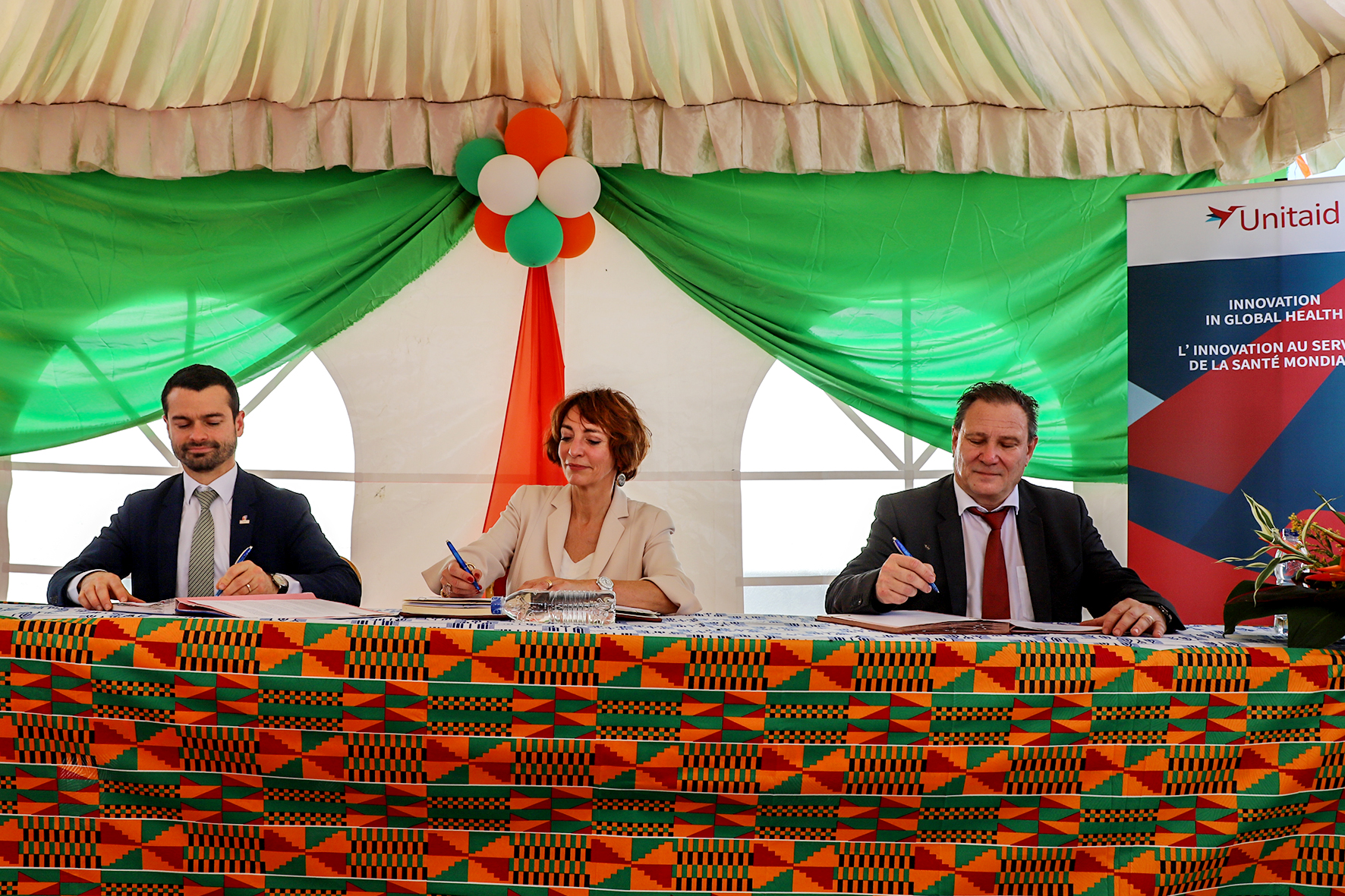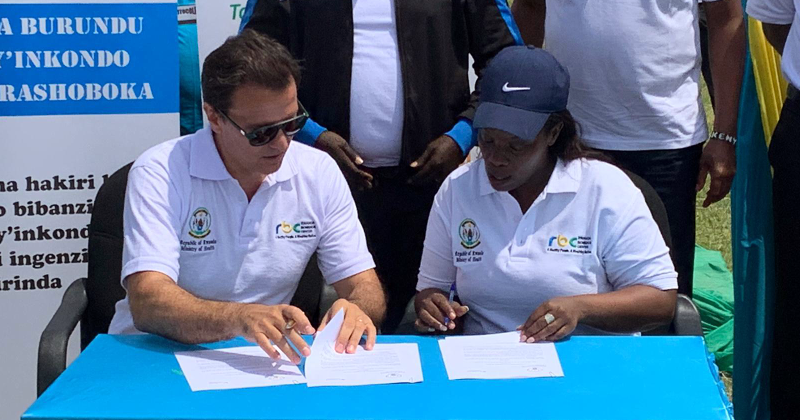The Hummingbird. Unitaid News – January 2020
Preventing cervical cancer in low-resource countries
Unitaid and Expertise France join forces to intensify cervical cancer prevention in Côte d’Ivoire, Burkina Faso, Guatemala and the Philippines
Abidjan – Unitaid and Expertise France today signed a financing agreement for the implementation of the SUCCESS project, Scale Up Cervical Cancer Elimination with Secondary prevention Strategy. Focused on cervical cancer control, the project’s objective is to strengthen screening and secondary prevention to prevent the development of cancer in women infected with human papillomavirus (HPV) who have precancerous lesions. This project will be implemented in four low- and middle-income countries representative of low-resource regions where more than 85% of the women who die from the disease today live.
SUCCESS: ensure the feasibility of early detection and management as close as possible to the population
The agreement signed today between Unitaid and Expertise France provides for three-year funding from Unitaid for a total of €22 million, with a €600,000 additional co-financing from the French government. This project is part of Unitaid’s €54 million in investment in cervical cancer prevention. Unitaid’s investment responds to the World Health Organization’s (WHO) call for action to eliminate cervical cancer by 2030.

The SUCCESS project targets women most at risk and will be implemented in Côte d’Ivoire, Burkina Faso, Guatemala and the Philippines. It will include at least 185,000 women within three years, 75,600 (40%) of whom are living with HIV. People who are immunocompromised and infected with HPV are more likely to develop pre-cancer and cancer more quickly.
SUCCESS will implement a cervical cancer control approach based on:
- Reinforced and simplified screening,
- Secondary prevention of cervical cancer through HPV testing and thermal ablation of precancerous lesions,
- An intensification of the dissemination of information on this cancer to the populations concerned.
With its regional approach, SUCCESS will enable the targeted countries and beyond to scale up services to cover 70% of women concerned.
The project will be implemented by Expertise France, in collaboration with a consortium of organizations with experience and expertise in the prevention and control of cervical cancer: Jhpiego and the Union for International Cancer Control (UICC). The project will also rely on the technical support of the National Cancer Control Institutes: the French National Cancer Institute (INCa), National Cancer Institute (NCI) – United States, National Cancer Center (NCC) – Japan and National Cancer Institute (INCA) – Brazil.
Cervical cancer: one of the easiest cancers to prevent and treat, but the fourth most common cancer among women in the world
In 2018, according to the WHO, cervical cancer accounted for 570,000 new cases and 311,000 deaths. This cancer is particularly deadly among women living with HIV, especially those who are not on antiretroviral treatment or who started treatment late. This cancer is mainly caused by HPV. Some genotypes of this virus lead to the formation of precancerous lesions, which are targeted in the intervention strategy of the SUCCESS project. Nine out of ten women who die from cervical cancer live in low- and middle-income countries where access to information about prevention is limited.
Cervical cancer is curable if diagnosed at an early stage. The WHO’s new global strategy for 2020-2030 on the elimination of cervical cancer highlights the crucial role of cervical cancer screening and treatment.
Related publications:
- Unitaid and CHAI sign grant to prevent cervical cancer deaths
- Unitaid launches call for proposals to help eliminate cervical cancer
- Call for Proposals: Preventing deaths from cervical cancer
- Cervical cancer. Screening and treatment of pre-cancerous lesions for secondary prevention of cervical cancer (Technology landscape)
- Five facts about cervical cancer and how Unitaid is battling the disease
Our Projects:
- Innovative, affordable screening and treatment to prevent cervical cancer
- Intensifying and promoting cervical cancer prevention in low-resource countries
Press contacts:
Unitaid: Sarah Mascheroni, mascheronisa@unitaid.who.int, +41 79 728 73 11
Expertise France: Nadia Hamidouche, nadia.hamidouche@expertisefrance.fr, +33 (0)6 77 27 27 72 13
The Hummingbird. Unitaid News – December 2019
The Hummingbird. Unitaid News – September 2019
The Hummingbird. Unitaid News – August 2019
Rwanda and Unitaid to collaborate on health innovations including screen-and-treat tools to prevent cervical cancer
Kigali – The Ministry of Health of Rwanda, Unitaid and Clinton Health Access Initiative (CHAI) launched a project aimed at preventing cervical cancer in Rwanda at an event led by the Minister of Health Dr. Diane Gashumba.
“Rwanda is a leading early adopter of innovation. Unitaid is delighted to bring affordable and innovative solutions to prevent cervical cancer cases in Rwanda, empowering girls and women to lead healthy lives,” Unitaid Executive Director Lelio Marmora said.

Unitaid recently signed a $33 million grant with CHAI to develop screen-and-treat solutions for preventing cervical cancer in low-resource settings for less than $1. Rwanda is among the first countries where these innovations are being implemented; the project complements Rwanda’s human papillomavirus vaccination efforts that have reached 93% of girls aged 12 years old.
“Cervical cancer can be prevented if caught early. The Government of Rwanda is pleased to join forces with Unitaid in bringing affordable screen-and-treat innovations to girls and women in Rwanda,” Dr. Gashumba said.
Unitaid and Rwanda’s Ministry of Health further signed an agreement to collaborate on better and more affordable health solutions for the people of Rwanda and beyond. The memorandum of understanding positioned Rwanda as a “champion of innovation acceleration in health” and provides a framework for the country to continue to increase access to affordable and effective health innovations that tackle the most pressing public health problems.
The visit to Rwanda also included a meeting with H.E. Mrs. Jeannette Kagame, First Lady of Rwanda and Chairperson of the Imbuto Foundation, where fruitful discussions were held about future collaboration.
Unitaid grants are directly supporting Rwanda’s health landscape through projects inside the country, and indirectly, through many other investments that develop health innovations and create the conditions for them to be widely introduced.
Examples:
- Unitaid’s project with Innovative Vector Control Consortium is new-generation bed nets and insecticides to Rwanda’s fight against malaria. In 2018 alone, more than 800,000 Rwandans were protected with the new insecticides, including nearly 12,000 pregnant women and 118,000 children under five. Introduced at full scale, the new insecticides could avert more than 2 million cases of malaria in Rwanda between 2020 and 2024.
- Unitaid’s project with Elizabeth Glaser Pediatric AIDS Foundation was the first to introduce integrated point-of-care early infant HIV diagnosis into national laboratory networks in Rwanda. The project allowed thousands of HIV-exposed infants to be tested, initiating lifesaving treatment within two days for 98 percent of those who tested positive.
- Unitaid accelerated access to paediatric TB medicines by helping countries update their treatment policies, promoting demand, and creating incentives for drug companies to develop new products. In 2018, Rwanda began procuring the child-friendly formulations, which are now available in all 30 districts.
- Unitaid’s investment in the Self Testing for Africa (STAR) project helped shape the first WHO guidelines on HIV self-testing in 2016. Rwanda now includes self-testing in its national guidelines.
For more examples please refer to the following URL: Rwanda impact note
For more information: Priyamvada CHUGH, chughp@unitaid.who.int





